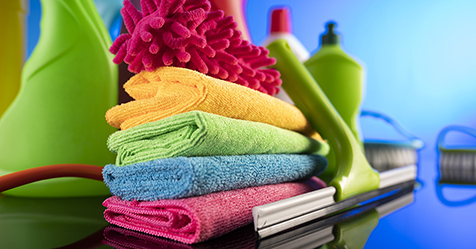Imagine working the 9-to-5 grind, then clocking into a cleaning job an hour later. Ramiro Álvarez, chief operating officer of facilities services at Grupo EULEN USA, a nationwide facility services provider headquartered in Miami, explained this scenario is a reality for many cleaning professionals.
“We have clients that operate 24/7, and the bulk of our services occur after 6 p.m.,” he said. “A large number of our workers are coming from working a full-time job. They are already physically and mentally tired.”
Joe Coleman, regional director of operations at SSC Services for Education, a facility service provider for K-12 and higher education buildings, oversees night shift employees who clean athletic facilities, lab spaces, classrooms, and other college and university areas in the Northeast. Like Álvarez, he said many of his employees work a day job before starting their nighttime cleaning
jobs at the schools. “Physiologically, people are not nocturnal creatures,” Coleman said. However, instead of going home to rest after a day of work, many cleaning professionals are powering through their fatigue to work a second shift. This fatigue can put them at risk of injuries.
Take five for safety
To help keep Grupo EULEN cleaning staff attuned to safety matters, even during times when they would usually be asleep, workers start each shift with a safety moment. Álvarez explained the moment comprises a less than five-minute safety talk delivered by a supervisor. “We remind workers not to use headphones because they won’t hear emergency alerts or people who are approaching them,” he said. “We advise them to look around their surroundings and to report any hazards they see.”
Álvarez said the company has more than 100 safety topics prepared, depending on the season and facility type. “If it’s summer and people are working outside in the heat, we talk about staying
hydrated,” he said. “If it is winter, we talk about avoiding slips and falls on the ice.”
Grupo EULEN reinforces the safety moments topics with visuals it posts in janitor closets and other sites to remind workers of company policies and practices. In addition to these traditional training procedures, the company utilizes technology to keep its employees current on safety protocols. Each employee has access to regular training through a software program that automatically assigns topics throughout the year, reminds them when they forget to complete the digital courses, and keeps their supervisors updated on their training progress. “They can take the courses on their phones or computers,” Álvarez explained. “They can come into the office to do the training. We even have tablets at many of the sites to give them access to this training.”
The company supplements its training with the proper safety equipment. “To be in compliance with the safety training, they must wear the safety gear we provide, such as earplugs in loud environments and steel-toe shoes if the environment requires it,” Álvarez said.
Industrywide, slips, trips, and falls are the most common injuries, often caused by uneven surfaces, spills, and a lack of visuals, such as signs that warn of hazards, according to Álvarez. To mitigate the risk of falls, employees assigned to areas with wet floors, due to mopping or other circumstances, are provided with anti-slip shoes.
Other common hazards include muscle sprains and strains, which companies can prevent by training employees on proper lifting techniques, and repetitive stress injuries. “We cross-train our
employees, so they are doing a variety of tasks instead of repeating the same action,” Álvarez said. Grupo EULEN also trains its supervisors to pay attention to the hourly workers’ demeanor, to ensure no one is ill, exhausted, or under the influence of alcohol or drugs. All employees must take breaks if they are working more than four hours. “Even if they are working a shorter shift, they
can definitely take a break to take a sip of water or take medication,” Álvarez said. “We empower people to be their own safety manager.”
Practice safety in numbers
Cleaning professionals working alone in empty facilities are more likely to become victims of crime. To avoid isolated workers, 90% of Grupo EULEN’s accounts feature a buddy system in which pairs of cleaning professionals work together, Álvarez said. However, smaller accounts may have staff members working alone. In those instances, workers should perform a visual inspection of the space they are entering. If a person the worker does not know is in that space, the worker should make eye contact with the person. If, after doing that, the worker does not feel secure, they should leave the space and call a supervisor.
If a visual inspection reveals no one else in the space, workers should lock the door behind them before beginning their duties. “If they need assistance, every employee has their supervisor’s
cellphone number, so there is always a means of communication for emergencies,” Álvarez said.
SSC night shift workers travel between campus buildings in groups of five or more, especially on urban campuses, Coleman said. Once they arrive at their destination, they pair up. “Our policy is
that people should not be working alone, so we always try to schedule our workers in teams of at least two,” he said. “We always have people in leadership positions, whether it be supervisors or
managers, on all shifts that hourly workers can call if they need assistance. Campus security or police are available to them, too.”
Seek out the light
Although lighting is something most of us take for granted on the job, night shift workers are sometimes surprised by the lack of it.
“From an actual job perspective, the lighting is always a lot less than you expect,” Coleman said. “If you work during the day and have sunlight streaming through the windows, you don’t usually
think about it. But once the sun is down, deep cleaning and floor work becomes more difficult, especially in older buildings that just don’t have good lighting. Sometimes you need to bring in
extra lighting.”
Álvarez added that dimly lit spaces are often a contributing factor to accidents and injuries. Workers should report any dimly lit spaces, such as dumpster areas, to their supervisors. Then
it is up to the supervisor to communicate with the client. “We can provide the employees with flashlights or other lighting options for dark areas,” Álvarez said. “Obviously, that is not ideal;
the best thing is to work with the client to resolve the issue.”
Along with the lighting, sometimes HVAC services are turned off during non-business hours to save costs. “Every organization is looking for ways to reduce its costs, such as shutting off the air
conditioning after hours,” Álvarez said. “Whenever we become aware of an issue, we report it to the property manager so they can make sure that air conditioning or heat is on through the hours when the cleaning staff is on the premises.”
Focus on rest and nutrition
In addition to a lack of light, working the night shift often means a lack of meal options as cafeterias and restaurants are closed, leaving hungry workers to contemplate the offerings of vending machines.
“The food options at night are often nonexistent or not offering good nutritional value, unless you bring it from home,” Coleman said. He encouraged night shift employees to pack a variety of nutrient-dense food items instead of a single large, heavy meal. “It’s better to have smaller meals that offer lots of protein to sustain you through the shift,” he said.
Sleepiness can be even a bigger problem than hunger for night shift workers, especially when their sleep schedule conflicts with that of those around them. “Just because you work at night, it
doesn’t mean all the people in your household do too,” he said.
Investing in earplugs or room-darkening shades can help block daytime distractions. “Try to get as much sleep as you can, stay hydrated, and eat good food,” Coleman advised. “Getting fresh air whenever possible can reinvigorate you. Maintaining a healthy lifestyle can help you get through difficult schedules.”
Embrace a safety culture
A company’s culture enhances any efforts employees take to follow a healthy lifestyle. “Organizations with a strong health and safety culture don’t just talk about it; they truly live it,” Álvarez said. “They have the policies and processes in place, and all employees on all shifts benefit from their programs.”
Álvarez said that although most companies talk about the importance of safety, not all companies follow through. He said companies must not only provide shiftwork employees with information
and tools to prevent accidents, but they must also document any injuries that occur, provide support for the injured employees, and implement steps to prevent these incidents from recurring.
“Years ago, I was with a company, and this sounds crazy, but within one month, there were three accidents of the same type in the same building,” Álvarez recalled. “There was no documentation of the accidents, no investigations, so it kept happening. Having a culture of safety and communication would have prevented the accident from happening again.”
Night Shift Quick Tips
Franchisees with Anago Cleaning Systems, headquartered in Pompano Beach, Florida, offered tips on what keeps them going while working the night shift:
Prioritize sleep ahead of time. Try to get at least seven to nine hours of rest in the 24 hours before your shift. Take strategic naps. A 20 to 30-minute nap before your shift can boost alertness without making you groggy. Fuel wisely. Eat a balanced meal with protein, complex carbs, and healthy fats before work. Heavy or greasy meals can make you sluggish.
Mimoza Duni, South Florida
Rest during the day as if it were night. I use blackout curtains to help me sleep. Stay hydrated.
Eddie Chatman, The Triangle, North Carolina
Put some music on while you work (listen without headphones) and have something cold to drink. I try to always have someone working with me who I can talk to.
Shamire Teasley, The Triangle, North Carolina
Engage your brain by listening (without headphones) to upbeat music or podcasts. Rotate tasks to avoid monotony. Wash your face with cold water, do exercises, or even chew gum to stay alert.
Travis Scotton, The Triangle, North Carolina
Get plenty of fresh air. Stay on your feet as much as possible.
Mary Little, The Triangle, North Carolina




